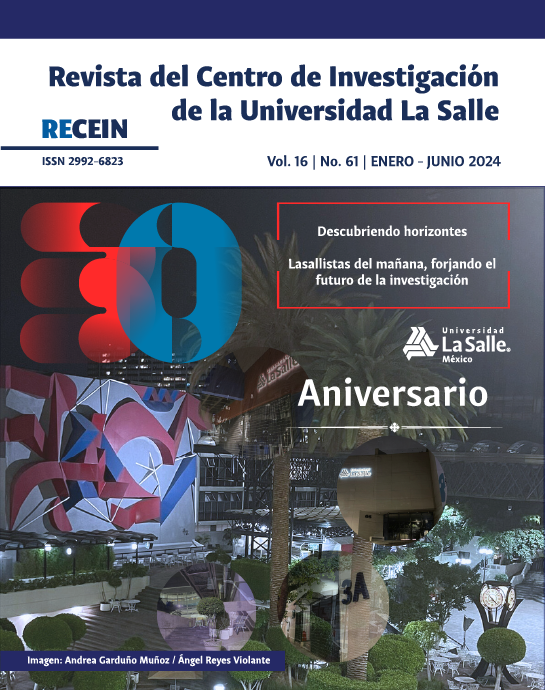Social entrepreneurship and the creation of social value: the case in the Mexico northeast494
Contenido principal del artículo
Resumen
Social entrepreneurship (SE) has been observed as a process in companies, while the figure of the social enterprise gains relevance as a perfect unit of analysis to evaluate it. The objective is to determine the effect of social entrepreneurship in the creation of social value at Huasteca Tamaulipeca of Mexico, a region that offers different conditions to those traditionally approached worldwide. A model was test using a sample of 148 observations with partial least squares (PLS) as the technique. The dimensions of ES innovativeness, risk management and socialness have direct effects on the creation of social value. The results provide an overview of the social entrepreneurship, positioning it as an important tool to create social value.
Descargas
Detalles del artículo

Esta obra está bajo una licencia internacional Creative Commons Atribución-NoComercial-CompartirIgual 4.0.
Esta revista se encuentra bajo la licencia de Creative Commons, por tanto, los autores, al postular su artículo, lo adhieren a dicha licencia.El autor puede disponer de su artículo para su archivo en repositorios institucionales o en páginas web personales, con la referencia y agradecimientos a la fuente donde se ha publicado.
Citas
Alarifi, G., Robson, P., & Kromidha, E. (2019). The Manifestation of Entrepreneurial Orientation in the Social Entrepreneurship Context. Journal of Social Entrepreneurship, 10(3), 307–327. https://doi.org/10.1080/19420676.2018.1541015
Caldwell, N. D., Roehrich, J. K., & George, G. (2017). Social Value Creation and Relational Coordination in Public-Private Collaborations. Journal of Management Studies, 54(6), 906–928. https://doi.org/10.1111/joms.12268
Conde, C. (2015). Social Enterprise in Mexico: Concepts in Use in the Social Economy. ICSEM Working Papers, 22, 41.
Conde, C. (2016). Entendiendo las diferentes perspectivas de las empresas sociales en México. Ciências Sociais Unisinos, 52(3), 321–342.
CONEVAL. (2020). CONEVAL Consejo Nacional de Evaluación de la Política de Desarrollo Social | CONEVAL Medición de la Pobreza. https://www.coneval.org.mx/Medicion/MP/Paginas/Pobreza-2018.aspx
Covin, J. G., & Slevin, D. P. (1991). A Conceptual Model of Entrepreneurship as Firm Behavior. Entrepreneurship Theory and Practice, 16(1), 7-26. https://doi.org/10.1177/104225879101600102
Cruz-Sandoval, M., Vázquez-Parra, J. C., & Alonso-Galicia, P. E. (2022). Student Perception of Competencies and Skills for Social Entrepreneurship in Complex Environments: An Approach with Mexican University Students. Social Sciences, 11(7), 314. https://doi.org/10.3390/socsci11070314
Dees, J. G. (2001). The Meaning of “Social Entrepreneurship”.
Diaz-Sarachaga, J. M., & Ariza-Montes, A. (2022). The role of social entrepreneurship in the attainment of the sustainable development goals. Journal of Business Research, 152, 242-250. https://doi.org/10.1016/j.jbusres.2022.07.061
Di Domenico, M., Haugh, H., & Tracey, P. (2010). Social Bricolage: Theorizing Social Value Creation in Social Enterprises. Entrepreneurship Theory and Practice, 34(4), 681–703. https://doi.org/10.1111/j.1540-6520.2010.00370.x
Dijkstra, T. K., & Henseler, J. (2015). Consistent partial least squares path modeling. MIS Quarterly = Management Information Systems Quarterly, 39(2), 297–316.
Dohrmann, S., Raith, M., & Siebold, N. (2015). Monetizing Social Value Creation – A Business Model Approach. Entrepreneurship Research Journal, 5(2). https://doi.org/10.1515/erj-2013-0074
Dwivedi, A., & Weerawardena, J. (2018). Conceptualizing and operationalizing the social entrepreneurship construct. Journal of Business Research, 86, 32–40. https://doi.org/10.1016/j.jbusres.2018.01.053
Felício, J. A., Martins, H., & da Conceição Gonçalves, V. (2013). Social value and organizational performance in non-profit social organizations: Social entrepreneurship, leadership, and socioeconomic context effects. Journal of Business Research, 66(10), 2139–2146. https://doi.org/10.1016/j.jbusres.2013.02.040
Fornell, C., & Larcker, D. F. (1981). Evaluating Structural Equation Models with Unobservable Variables and Measurement. Journal of Marketing Research, 18(1), 39–50. https://doi.org/doi:10.2307/3151312
Gali, N., Niemand, T., Shaw, E., Hughes, M., Kraus, S., & Brem, A. (2020). Social entrepreneurship orientation and company success: The mediating role of social performance. Technological Forecasting and Social Change, 160, 120230. https://doi.org/10.1016/j.techfore.2020.120230
Hair, J., Hult, G. T. M., Ringle, C. M., & Sarstedt, M. (2017). A primer on partial least squares structural equation modeling (PLS-SEM). Sage.
Hair, J., Risher, J., Sarstedt, M., & Ringle, C. (2019). When to use and how to report the results of PLS-SEM. European Business Review, 31(1), 2-24. https://doi.org/10.1108/EBR-11-2018-0203
Halberstadt, J., Niemand, T., Kraus, S., Rexhepi, G., Jones, P., & Kailer, N. (2020). Social entrepreneurship orientation: Drivers of success for start-ups and established industrial firms. Industrial Marketing Management, 94, 137-149. https://doi.org/10.1016/j.indmarman.2020.06.012
Henseler, J., Ringle, C. M., & Sarstedt, M. (2015). A new criterion for assessing discriminant validity in variance-based structural equation modeling. Journal of the Academy of Marketing Science, 43(1), 115–135. https://doi.org/10.1007/s11747-014-0403-8
Henseler, J., Ringle, C. M., & Sarstedt, M. (2016). Testing measurement invariance of composites using partial least squares. International Marketing Review, 33(3), 405-431. https://doi.org/10.1108/IMR-09-2014-0304
Hlady-Rispal, M., & Servantie, V. (2018). Deconstructing the Way in which Value Is Created in the Context of Social Entrepreneurship: Deconstructing the Way in which Value is Created. International Journal of Management Reviews, 20(1), 62–80. https://doi.org/10.1111/ijmr.12113
Hu, L., & Bentler, P. M. (1998). Fit indices in covariance structure modeling: Sensitivity to underparameterized model misspecification. Psychological Methods, 3(4), 424–453. https://doi.org/10.1037/1082-989X.3.4.424
Instituto Nacional de Estadística y Geografía. (2020). Directorio Nacional de Unidades Económicas. DENUE.. INEGI. https://www.inegi.org.mx/app/mapa/denue/default.aspx
Jensen, M. C., & Meckling, W. H. (1976). Theory of the firm: Managerial behavior, agency costs and ownership structure. Journal of Financial Economics, 3(4), 305-360. https://doi.org/10.1016/0304-405X(76)90026-X
Kang, H. (2021). Sample size determination and power analysis using the G*Power software. Journal of Educational Evaluation for Health Professions, 18, 17. https://doi.org/10.3352/jeehp.2021.18.17
Kraus, S., Niemand, T., Halberstadt, J., Shaw, E., & Syrjä, P. (2017). Social entrepreneurship orientation: Development of a measurement scale. International Journal of Entrepreneurial Behavior & Research, 23(6), 977–997. https://doi.org/10.1108/IJEBR-07-2016-0206
Klarin, A., & Suseno, Y. (2023). An Integrative Literature Review of Social Entrepreneurship Research: Mapping the Literature and Future Research Directions. Business & Society, 62(3), 565-611. https://doi.org/10.1177/00076503221101611
Liu, G., Eng, T.-Y., & Takeda, S. (2015). An Investigation of Marketing Capabilities and Social Enterprise Performance in the UK and Japan. Entrepreneurship Theory and Practice, 39(2), 267–298. https://doi.org/10.1111/etap.12041
Lobato-Calleros, M. O., Fabila Rodriguez, K., Carrera-Lobato, P., & Carrera-Lobato, R. (2016). Development and testing of an assessment model for social enterprises: The case of Capeltic in Mexico. Business Process Management Journal, 22(5), 1009–1020. https://doi.org/10.1108/BPMJ-01-2016-0027
Mair, J., & Martí, I. (2006). Social entrepreneurship research: A source of explanation, prediction, and delight. Journal of World Business, 41(1), 36–44. https://doi.org/10.1016/j.jwb.2005.09.002
Musinguzi, P., Baker, D., & Villano, R. A. (2023). Interrelationships amongst critical success factors and rural social enterprises’ performance in a developing country context. Journal of Rural Studies, 100, 102995. https://doi.org/10.1016/j.jrurstud.2023.03.003
Münch, L., & Ángeles, E. (2007). Métodos y técnicas de investigacion (3ra. Ed.). Trillas. https://www.calameo.com/read/0061884020905df2322c4
Núñez-Pomar, J. M., Escamilla-Fajardo, P., & Prado-Gascó, V. (2020). Relationship between entrepreneurial orientation and social performance in Spanish sports clubs. The effect of the type of funding and the level of competition. International Entrepreneurship and Management Journal, 16, 981-999. https://doi.org/10.1007/s11365-020-00660-3
Palacios-Marqués, D., Guijarro, M., Sánchez, M. M., & Alguacil-Mari, M. P. (2019). Social entrepreneurship and organizational performance: A study of the mediating role of distinctive competencies in marketing. Journal of Business Research, 101, 426–432. https://doi.org/10.1016/j.jbusres.2019.02.004
Pereda, V. J., & Padilla, L. S. (2016). La escasez de agua en la Huasteca. Revista Universitaria de Geografía, 25(2), 133-165.
Peredo, A. M., & McLean, M. (2006). Social entrepreneurship: A critical review of the concept. Journal of World Business, 41(1), 56–65. https://doi.org/10.1016/j.jwb.2005.10.007
Peris-Ortiz, M., Rueda-Armengot, C., & Palacios-Marqués, D. (2016). Is it possible to measure social entrepreneurship in firms? Cuadernos de Gestión, 16(2), 15–28. https://doi.org/10.5295/cdg.140469mp
Rigdon, E. E., Sarstedt, M., & Ringle, C. M. (2017). On Comparing Results from CB-SEM and PLS-SEM: Five Perspectives and Five Recommendations. Marketing ZFP, 39(3), 4–16. https://doi.org/10.15358/0344-1369-2017-3-4
Rubalcava de León, C. A., & Zerón Félix, M. (2020). La empresa social: Contexto mexicano. CIENCIA ergo-sum, 27(3). https://doi.org/10.30878/ces.v27n3a3
Saebi, T., Foss, N. J., & Linder, S. (2019). Social Entrepreneurship Research: Past Achievements and Future Promises. Journal of Management, 45(1), 70–95. https://doi.org/10.1177/0149206318793196
Sarstedt, M., Hair, J. F., Cheah, J.-H., Becker, J.-M., & Ringle, C. M. (2019). How to Specify, Estimate, and Validate Higher-Order Constructs in PLS-SEM. Australasian Marketing Journal, 27(3), 197–211. https://doi.org/10.1016/j.ausmj.2019.05.003
Satar, M. S., & Natasha, S. (2019). Individual social entrepreneurship orientation: Towards development of a measurement scale. Asia Pacific Journal of Innovation and Entrepreneurship, 13(1), 49–72. https://doi.org/10.1108/APJIE-09-2018-0052
Shin, C., & Park, J. (2019). How Social Entrepreneurs’ Value Orientation Affects the Performance of Social Enterprises in Korea: The Mediating Effect of Social Entrepreneurship. Sustainability, 11(19), 5341. https://doi.org/10.3390/su11195341
Singh, A. (2016). The Process of Social Value Creation: A Multiple-Case Study on Social Entrepreneurship in India. Springer India. https://doi.org/10.1007/978-81-322-2827-1
Son, H., Lee, J., & Chung, Y. (2018). Value Creation Mechanism of Social Enterprises in Manufacturing Industry: Empirical Evidence from Korea. Sustainability, 10(1), 46. https://doi.org/10.3390/su10010046
Steiner, A., Jack, S., Farmer, J., & Steinerowska-Streb, I. (2022). Are They Really a New Species? Exploring the Emergence of Social Entrepreneurs Through Giddens’s Structuration Theory. Business & Society, 61(7), 1919-1961. https://doi.org/10.1177/00076503211053014
Syrjä, P., Puumalainen, K., Sjögrén, H., Soininen, J., & Durst, S. (2019). Entrepreneurial orientation in firms with a social mission—A mixed-methods approach. Cogent Business & Management, 6(1), 1602016. https://doi.org/10.1080/23311975.2019.1602016
Tsirogianni, S., & Gaskell, G. (2011). The Role of Plurality and Context in Social Values: The Role of Plurality and Context in Social Values. Journal for the Theory of Social Behaviour, 41(4), 441-465. https://doi.org/10.1111/j.1468-5914.2011.00470.x
Urbano, D., Toledano, N., & Soriano, D. R. (2010). Analyzing Social Entrepreneurship from an Institutional Perspective: Evidence from Spain. Journal of Social Entrepreneurship, 1(1), 54–69. https://doi.org/10.1080/19420670903442061
Weerawardena, J., & Sullivan Mort, G. (2006). Investigating social entrepreneurship: A multidimensional model. Journal of World Business, 41(1), 21–35. https://doi.org/10.1016/j.jwb.2005.09.001
Weerawardena, J., Salunke, S., Haigh, N., & Sullivan Mort, G. (2019). Business model innovation in social purpose organizations: Conceptualizing dual social-economic value creation. Journal of Business Research, 125, 762-771. https://doi.org/10.1016/j.jbusres.2019.10.016
 English
English


